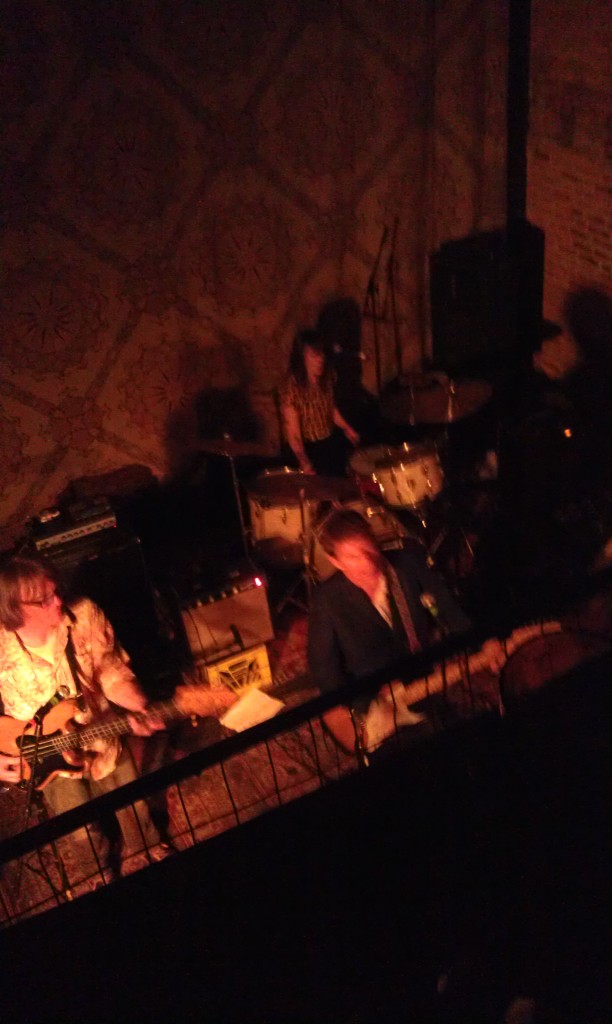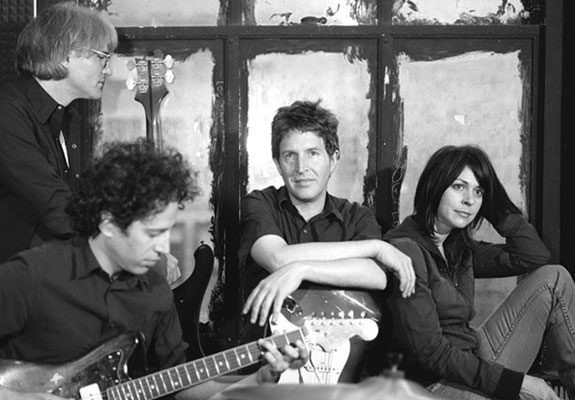
Steve Wynn & The Miracle 3 at the North Star Bar
I had intended to write this review in the wee hours of Sunday morning, while the post-gig metal machine music tinnitus was subsiding, while the deep satisfaction of seeing veteran bands do their thing was warming my already stoked heart (a heart that had, earlier in the day, seen veteran Man of the [Baseball] People Jim Thome smash a record-breaking walk-off home run), while conversations with the many Townspeople and other old music-scene colleagues were still fresh in mind. Instead I took some Tylenol PM, jotted down a few notes, and allowed myself to crash in preparation for Sunday’s day-long engagement party for my brother and his equally young-at-heart fiancee.
Freeda bassist!
That was the underlying message I took out of Saturday night’s show at Philadelphia’s North Star Bar, featuring The Fleshtones and Steve Wynn & The Miracle 3.
I love the bass guitar. Forty years after first wanting to be a guitar player I wish I’d chosen to be a bassist. No musician brings the “secret sauce” more effectively than a bassist. Except for a couple of freaky fusion bassists who don’t really count, bassists inherently start from a position of servitude. Like the ideal servant, however, the great bassists quietly lead from within, “powering up” the rhythm section, even saving the rest of a band from its worst impulses or limitations. A bassist can hunker down and drive a rhythm. A bassist can lay out on a key beat and imply some cool feeling that may not otherwise be evident in a song. A bassist can swoop high on the fretboard, playing “above the rim” while still holding down the lowest, least-obtrusive frequencies in a mix.
Freeda bassist!
The electric bass took off in the mid-’60s, when technology first allowed the instrument to be felt and heard. Motown’s James Jamerson was ready for the change. Stax/Volt house bassist Donald “Duck” Dunn caused no waves as a free bassist but relished his freedom nevertheless. Time had come for James Brown’s bassists to become movers and shakers in the free world. The Wrecking Crew’s Carol Kaye came a long way, baby. British Invasion bassists like John Entwistle and Paul McCartney set freedom marching across the globe. By the late-’60s bassists were regularly threatening to outshine the guitarists in their bands. Even people who don’t like the Grateful Dead, for instance, find merit in Phil Lesh‘s loping, melodic style. Lord knows I did the one time I saw the Dead in concert and had to sit through 3 hours of out-of-tune singing; lazy, noodling guitar runs; and unbathed, braless hippie chicks in threadbare t-shirts and long, floral skirts. Only Lesh and the mild pleasures of the swaying hippie chicks held my attention and kept me from reeling off into a bad trip, man. I am forever grateful to Phil Lesh for his prominent part in the mix that night in Chicago.
McCartney was up there with Jamerson as the freest of bassists: fluid, inventive, throbbing, you name it. They may have been the first two bass players of the rock era to receive the coveted All-Access Pass on their instrument. The All-Access Pass would later be used to infiltrate the deepest reaches of referential rock ‘n roll recordings by Bruce Thomas through his work with Elvis Costello & The Attractions. Just think of the half dozen mediocre Costello songs made worthwhile by the bassist.
Freeda bassist!


